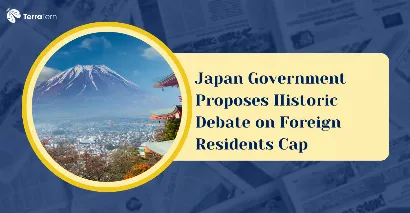Key Highlights
Japan needs to undertake a crucial review of its policy for foreign residents, and should discuss whether to introduce a cap, a government report issued on Friday, Aug. 29, 2025, suggests. The advice is being given at a time when there is growing public concern over a surge of foreign, temporary and permanent migrants, which helped the ruling coalition lose its majority in the recent July upper house election.
The discussion around the Japan foreign residents cap represents a significant evolution in the nation's approach to immigration policy, as the country finds itself navigating the delicate balance between workforce needs and social considerations.
Current Immigration Policy Framework
Japan has not yet unified its policies in regard to foreign nationals, according to Justice Minister Keisuke Suzuki, the minister in charge of the immigration agency. The minister pointed out in Friday's report that there has been no debate over the impact on society, potential friction, quantitative management of foreign residents, or the system for optimising foreign resident-related systems.
The world's fourth-largest economy has already placed certain caps on some visa classes. Currently, the government has set a cap of 820,000 for foreigners with a skilled worker visa for the five years starting April 2024. On top of this, Japan's also instituting a technical intern visa, which should go into effect in 2027, and they're limiting that number as well.
|
Visa Type |
Cap/Limit |
Implementation Period |
|
Skilled Worker Visa |
820,000 |
Five years starting April 2024 |
|
Technical Intern Visa |
To be capped |
Expected from 2027 |
Also Read: Get a Japan Work Visa For Indians In 5 Steps
Rising Anti-Immigration Sentiment
The timing of this immigration policy review is particularly significant given the political climate in Japan. Growth in support for an anti-immigration party in July's upper house election contributed to the ruling coalition's loss of its majority. This political shift reflects broader public concerns about the increasing number of foreign nationals in the country. In response to these concerns, the government has taken several measures:
-
Established a cross-agency body to address issues such as crime and overtourism involving foreigners
-
Announced plans to introduce tougher requirements for visas for foreign entrepreneurs
-
Created a project team within the Immigration Services Agency to initiate discussions on potential caps
Foreign Population Growth Trends
The number of foreign nationals in Japan reached 3.8 million last year, representing a 10.5% increase from the previous year. These foreign residents now account for approximately 3% of the country's total population.
Foreign National Population Statistics
The rapid growth in foreign population has raised concerns about social integration and infrastructure capacity. Justice Minister Suzuki noted that foreign residents could constitute more than 10% of the population in the future due to Japan's shrinking population and continued immigration.
|
Year |
Foreign Nationals Population (million) |
Year over Year Growth (%) |
Foreign Nationals % of Total Population |
|
2024 |
3.8 |
10.5 |
3 |
Proposed Solutions and Future Considerations
The government report calls for the introduction of temporary limits on visitors (who are foreigners with various residence statuses) when a rapid increase of foreigners would "indicate that the level of social friction is too high". This would permit dynamic policy adjustments on the basis of social conditions rather than on the basis of hard numerical caps. Minister Suzuki laid out a number of key areas to consider for any future immigration cap policy:
-
Social and economic development effects
-
Taxation implications
-
Social security effects of this project
-
Public safety concerns
-
Long-term population policy
Also Read: Japan Immigration Made Easy: Latest Steps on Application
Balancing Workforce Needs with Social Concerns
Japan is in a special situation regarding the management of immigration policy. Historically, the country has sought to keep the population as homogeneous as possible, through stringent immigration policies, but has gradually relaxed these policies to make up for a compacting and ageing workforce.
The increasing aging population and decreasing childbearing population have resulted in severe shortages of labor forces in many sectors and such shortages can only be addressed by the influx of foreign workers in order to sustain the economy. However, the influx of foreigners has also raised concerns about social integration, infrastructure strain, and cultural preservation.
International Context and Policy Comparisons
Japan's approach to immigration caps is not unique globally. Many developed nations grapple with similar challenges of managing immigration flows while addressing public concerns. The report suggests that Japan should learn from other countries' experiences with social integration and proactively consider countermeasures.
The government's consideration of stricter visa requirements for foreign entrepreneurs, announced this week, reflects a broader trend toward more selective immigration policies. These measures aim to attract skilled workers while maintaining better control over immigration flows.
Also Read: Latest Documents Required for Indian Passport Application
Timeline for Policy Implementation
The government has established a clear timeline for addressing immigration policy concerns:
-
August 2025 Government report recommending immigration policy review released
-
2027 Technical intern visa introduction with caps
-
Future: Potential implementation of broader foreign resident caps based on social friction levels
The Immigration Services Agency has already formed a task force to begin comprehensive discussions on potential immigration caps. This indicates that concrete policy proposals may emerge in the coming months.
Conclusion
The Japan foreign residents cap debate represents a critical juncture in the nation's immigration policy. As foreign nationals reach 3.8 million residents, the government must balance economic needs with social concerns while developing unified immigration policies.
The proposed review could fundamentally reshape Japan's approach to foreign residents, moving from ad-hoc policies to comprehensive immigration management. Success will depend on creating policies that address public concerns while maintaining Japan's economic competitiveness in an aging society.
For official immigration policies and visa information, visit the Ministry of Justice Immigration Services Agency website. To know more about Japan's new policy for Indians, visit TerraTern now!








